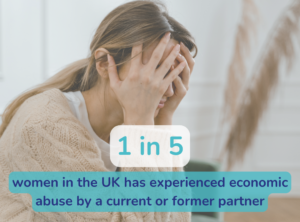Debt Awareness Week
1 in 5 women in the UK has experienced economic abuse by a current or former partner according to Surviving Economic Abuse. What is economic abuse, and would you recognise if it was happening to you?

Economic abuse is where a partner controls your access to money or other economic resources. This can include:
- Controlling your income
- Controlling your bank accounts
- Stopping you from working altogether to ensure you can’t earn any money
- Using you to access credit putting you into debt
- Spending your money
- Controlling what you can and can’t buy
- Damaging your possessions or property
- Withholding any entitled payments received, such as child maintenance and government benefits e.g., Universal Credit and Housing Benefit.
Economic abuse is a legally recognised form of domestic abuse defined in the Domestic Abuse Act 2021. As well as financial aspects of control, economic abuse also includes controlling access to and the use of transport and technology, which enable you to work. This coercive and controlling behaviour can also have a knock-on effect by restricting your ability to stay connected to others.
Spotting the signs
Here is a list of questions to consider; if you can answer ‘yes’ to one or more, you may be experiencing economic abuse.
Has your current or previous partner ever:
- Insisted they control all financial matters?
- Restricted you from accessing money you need to buy essentials, such as food, clothes, toiletries?
- Make you ask permission before making purchases, regardless of how small they are?
- Insisted you save receipts from purchases made to enable them to check?
- Required you to account for every penny you spend?
- Hidden money from you to stop you from accessing it?
- Stopped you from accessing your bank account?
- Insisted you get a credit card or loan in your name for them to use?
- Bought something using your bank cards, credit cards without your consent?
- Made you purchase things for them or pay their bills when you didn’t want to?
- Prevented you from going to work or stopped you from working altogether?
- Prevented you from going to your place of study – college or university?
- Insisted they
- Hidden important financial information from you?
- Kept log-in details, bank cards and PIN numbers to joint accounts to ensure you cannot access them?
- Stolen from you?
- Built up debt in your name?
- Insisted bills are in your name to ensure you had to pay them?
- Made you sign papers without telling you what they are for?
- Damaged, broken or destroyed your belongings?
- Spend money allocated to bills on other things?
- Make important financial decisions without you, e.g., buying a new home or car?
If you answered ‘yes’ – what can you do?
- Speak to us by calling 01623 683 250 or email [email protected]
- If outside of our office hours, you can contact the 24-hour National Domestic Abuse Helpline on 0808 2000 247 (run by Refuge)
- Call the Financial Support Line for Victims of Domestic Abuse on 0808 1963 699
- If it is safe to do so:
- Freeze any join accounts
- Change PIN numbers and online banking passwords
- Consider changing your email address and online account password
- Try to find out where important financial information is kept and take copies to leave with someone you trust
- Check your credit score to see if there are any debts in your name that you are unaware of. Survivors can use Credit Karma, Money Saving Expert and Clear Score free of charge
- If possible, create an escape fund where you put aside small amounts of money that won’t be missed. Keep it somewhere safe even if it isn’t in your home, you can leave it with a friend or neighbour who is aware of the situation
Recovering from domestic abuse?
Find out more about our services here.